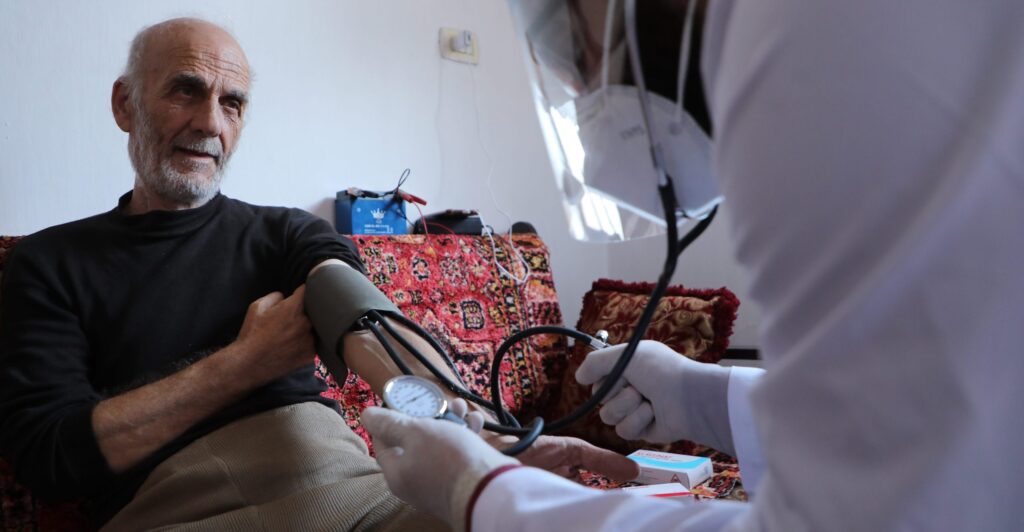Updates & Press
Blog Featured | December 10, 2021
Weekly Humanitarian News Digest – December 1
Author | MedGlobalComms

Latest News for December 3 – December 10, 2021
Afghanistan
A million children may die in Afghanistan this winter due to mass starvation. The economic crisis has been further exacerbated by the worst droughts the country has seen in decades and a continued lack of foreign aid. These conditions have led to 22.8 million people facing life-threatening levels of food insecurity. (NYTimes)
Bangladesh/ Myanmar
The effects of COVID-19 and the political crisis may lead to a tripling of urban poverty in Myanmar. Important industries have been hit hard by the pandemic and the political conflict. One third of families in urban areas are using up their savings due to reduced incomes and half of these families have no savings left. (Devdiscourse)
Colombia/ Venezuela
COVID-19 has triggered a sharp rise in gender-based violence, particularly in Colombia. UN OCHA reports more than 70% of women and girls in humanitarian settings said they or someone they knew experienced violence during the pandemic. In Colombia, a widening unemployment gap between men and women, mounting conflict from armed groups, and mass migration has put women in increasingly vulnerable situations. Women in rural areas of Colombia are even more vulnerable. (The New Humanitarian)
UNHCR and IOM report $1.79 billion needed to help Venezuelan migrants and refugees. Violence, food insecurity, collapse of the healthcare system and basic services in Venezuela have led people to flee, causing one of the largest displacement crises in the world. COVID-19 has only worsened the situation, leading to serious health impacts, economic disruptions, and exacerbated protection risks. The pandemic has also changed migration routes due to closed borders, forcing Venezuelans to take more dangerous journeys. (News UN)
Gaza/ Palestinian Territories
Three generations of Palestinian refugees living in Shatila camp are facing the Lebanese economic and political crisis and a major funding gap to UNRWA. This crisis will reduce access to education and healthcare services, including COVID-19 vaccines. Food, electricity, and water prices are beginning to be out of reach for most families. (Al Jazeera)
Haiti
Women and girls in Haiti have been particularly vulnerable following the earthquake. There have been reports of stress-related premature births and kidnapping, rape, and violence ocurring on a regular basis. Women in Haiti struggle to access education, have high levels of poverty and maternal mortality, and less access to jobs. (Metro)
Over 30,000 Haitians have been deported by the Dominican Republic to Haiti in 2021, with more than 12,000 in the past three months. The new government is seeking out both Haitians that have recently arrived in the DR and also those who have lived there for their whole lives. A large part of this targeting is being carried out by racially profiling individuals. Human rights groups are drawing attention to unlawful deportation of pregnant women and children. (ABC News)
India
High unemployment and a record contraction in the economy has pushed India into a hunger crisis. 90% of respondents in a 2020 survey reported a reduction in food intake due to lockdowns. The informal sector has taken the worst hit in the economic crisis, where 80% of India’s workforce makes a living. (The Washington Post)
Shutdowns of schools in Delhi due to air pollution are leading to a health and education emergency in India. COVID-19 lockdowns caused schools to be closed for 18 months, and now, schools are being closed again due to air pollution. Organizations are calling on authorities to find a solution which allows for children to continue their education. (Save the Children)
Lebanon
A survey finds that 63% of Lebanese people want to leave the country permanently. Around 85% reported that it was “difficult” or “very difficult” to survive on their income in Lebanon. These numbers have doubled since 2019. More than 80% of the population live under the poverty line. (National News)
The public sector in Lebanon has collapsed amid the crisis. Despite funding becoming available, the lack of cabinet meetings has made social assistance difficult to access. Bribery and corruption are rising within this system as citizens are unable to carry out basic paperwork procedures. (Reuters)
Pakistan
Smog crisis in Lahore causes breathing difficulties for citizens. These yearly smog conditions also increase the risk of preexisting conditions such as diabetes, lung diseases, asthma, heart disease, and cancer. Seasonal smog comes around November, in a city claimed as “the most-polluted city in the world.” (DW)
More than a third of Pakistan’s population is malnourished, with some regions reaching up to 50%. Malnutrition has risen because of poverty and a lack of resources due to Pakistan’s economic crisis. Recent droughts, water scarcity, and livestock shortages have further strained families. (IndiaTV)
Sudan
Violence over the past weekend in Darfur killed 50 people and displaced at least 2,000 children and adults. Internal displacements have been on the rise across Sudan in 2021. These violent crashes come as a result of factors including poverty, arms proliferation, political instability and the prolonged economic crisis. (Save the Children)
The COVID-19 pandemic, floods and political instability may lead to a third of Sudan’s population facing a humanitarian crisis if aid is not provided. Half of those in need are vulnerable women and children. Sudan also hosts 1.2 million refugees and asylum seekers who will be particularly vulnerable in this context. (Middle East Eye)
Syria
Economic conditions in Idlib are worsening due to the collapse of the Turkish lira. This has been the currency of the region since 2020. Around 75% of the population in Idlib is in need of humanitarian assistance. (Qantara)
Yemen
Fighting in Hudaida has displaced more than 25,000 people. This is the most conflict the region has seen since 2018. Clashes have also increased in Marib where over 64,450 people have been displaced since the beginning of the year. The ongoing crisis in Yemen has left millions facing food and medical shortages. (TRTWorld)


